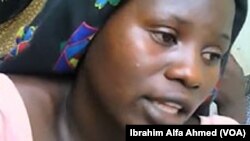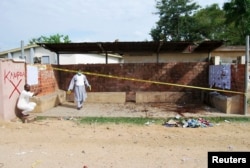For years, Nigerian militant group Boko Haram has used suicide bombers to attack public places such as markets and transportation hubs.
But in the past 18 months, the practice has taken an especially alarming turn with the increased use of women and children carrying out the deadly attacks. The agency has recorded 27 suicide attacks through mid-May of this year; 26 suicide attacks were reported for all of last year.
UNICEF child protection specialist Laurent Dutordoir said women and children reportedly were used as suicide bombers in at least three-fourths of these horrific incidents.
"Sometimes they are aware" of a bombing mission, sometimes not, he said.
"As for the profile of the child suicide bombers, it is not necessarily children who were abducted," Dutordoir continued. "It also includes children who seemingly were displaced, separated from their families and lacking basic protection, which rendered them vulnerable to exploitation, meaning … use by armed groups."
UNICEF estimated the number of unaccompanied and separated children in northeastern Nigeria could be as high as 10,000. The United Nations said more than 1.3 million Nigerians have been displaced by the vicious war Boko Haram has waged in the northeast since 2009.
Dutordoir said women and girls are increasingly being used as suicide bombers because, for cultural reasons, it is easier for them to slip through security than is the case with men and boys.
Since last July, girls between the ages of 7 and 17 have been involved in nine suicide incidents, he said.
"The main targets of the suicide attacks have been crowded, populated places, mainly markets and bus stations," Dutordoir said. "And, some of those locations have been attacked multiple times. In the past, also schools have been subjects of suicide attacks."
UNICEF said it fears the increasing use of children as suicide bombers could cast them as potential threats rather than as victims. It said this could harden hearts against all children associated with Boko Haram and hamper their rehabilitation and eventual reintegration into communities.
Hundreds rescued
Nigeria's military recently claimed it rescued approximately 700 women and children from the militants during an offensive to rout them from the Sambisa Forest, the Associated Press reported.
The AP said 275 of those freed were taken to a refugee camp May 2 and were transferred last week to a military facility, reportedly for more trauma counseling.
The Associated Press contributed to this report.









